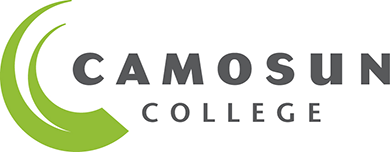Supporting the path to well-being
Archived Content
This archived web page remains online for reference, research or record-keeping purposes. This page will not be altered or updated and may contain out of date information. If you’re looking for specific information and haven’t found it, please contact communications@camosun.ca.
Linking to her Métis Roots
July 17, 2009
The first thing Celina Horn noticed was the Aboriginal artwork on the office walls. Her days had been filled with science courses in another building, so she was surprised to come across Camosun College’s Aboriginal Education & Community Connections (AECC) office. As she walked through the door, she mentioned that she had recently discovered her Métis roots, and the immediate welcome she received felt like a “sign” to continue the journey into her own cultural heritage.
 Celina grew up in Vancouver, BC, her Métis roots obscured by a couple generations of silent discomfort with this connection. However, her mother was proud to discover her grandmother was Cree and from the Carrot Creek area of Saskatchewan, and “she worked hard to collect data to support their Métis status,” says Celina.
Celina grew up in Vancouver, BC, her Métis roots obscured by a couple generations of silent discomfort with this connection. However, her mother was proud to discover her grandmother was Cree and from the Carrot Creek area of Saskatchewan, and “she worked hard to collect data to support their Métis status,” says Celina.
Inside the AECC office there is a poster that reads: “The Invisible People – We are Métis” sporting a picture of a red-haired child. Blond and green-eyed, Celina was unsure of her right to access services designed for Aboriginal learners.
“We often have people wander in, saying I think I’m Native but I’m not sure. I help them identify how this fits in their lives, and if it is significant,” says Suzanne Bate, Aboriginal Advisor. ”My goal is to create a sense of belonging for all Aboriginal students at Camosun.”
Helping people find their physical well-being
Celina’s newly-found community has offered her all kinds of support. She has enjoyed the warm environment, advisors to talk to, and linkages to organizations such as the Victoria Native Friendship Centre. Most recently, she was the recipient of the Mino-Ayaa Award (Ojibwe for “well-being”), given to Aboriginal students achieving or demonstrating exceptional commitment to physical well-being.
Her eventual goal is to be a rural physician. After taking two years of general courses at the University of Victoria, this ambition was stimulated by a year of traveling to South America.
“Looking at the poverty and inequity, I was struck with how much we have (in our society), and how much we don’t need,” says Celina.
Arriving back to Victoria, BC, she chose to attend Camosun College for a year in order to upgrade her science courses to a university level. However, her experience proved so positive, she then chose to stay for a second year to complete Camosun’s Associate Degree in Science before transferring to UBC’s pre-med program.
“I was used to huge auditoriums of people, so I have enjoyed the small class size, knowing all my instructors, and the additional lab experience Camosun can offer,” says Celina.
Celina is also living her talk, having sold her car to use a bike, buying locally where possible, travelling to local farms weekly to collect produce. “Our society is so convenient that until you’re shown a different way of doing things, you don’t really think about it. I want to lead by example. People in Victoria seem ready to make changes, more so than Vancouver,” she says. “It takes more planning. You have to keep a bag packed with raingear, and make sure there is room in a backpack for groceries.”
Joined by her boyfriend in her goals, she plans to apply to UBC’s rural physician program that runs out of the University of Northern British Columbia (UNBC) in Prince George, BC. She likes the idea of naturopathic medicine, but feels she can make the most impact by working as a physician in either in a smaller community or in another country.
Aboriginal Support Services
Aboriginal Education and Community Connections (AECC) offers education, financial and cultural support services for Aboriginal students (First Nations, Métis, Inuit and Native American), Aboriginal programs open to Aboriginal and non-Aboriginal students, and helps provide linkages between Camosun College, Aboriginal students, and local Aboriginal communities.
University Transfer Courses
University Transfer courses are just that—a wide variety of courses that are completely transferable to universities throughout British Columbia and elsewhere in Canada. Camosun offers 300 first- and second-year courses in the arts, sciences, business and health.
Last updated: February 18, 2010 11:33 am


